For a Highly Sensitive Person (HSP), experiencing life with an amplified awareness can be both a gift and a challenge.
If you’re one…you know the world can feel pretty intense at times.
Little situations like a busy environment, a casual comment, or even a slight change in routine can trigger a sense of overwhelm that seems to linger.
But here’s the thing: it’s not only your sensitivity that affects your well-being; the stress you often experience plays a major role too.
Read on to learn more!
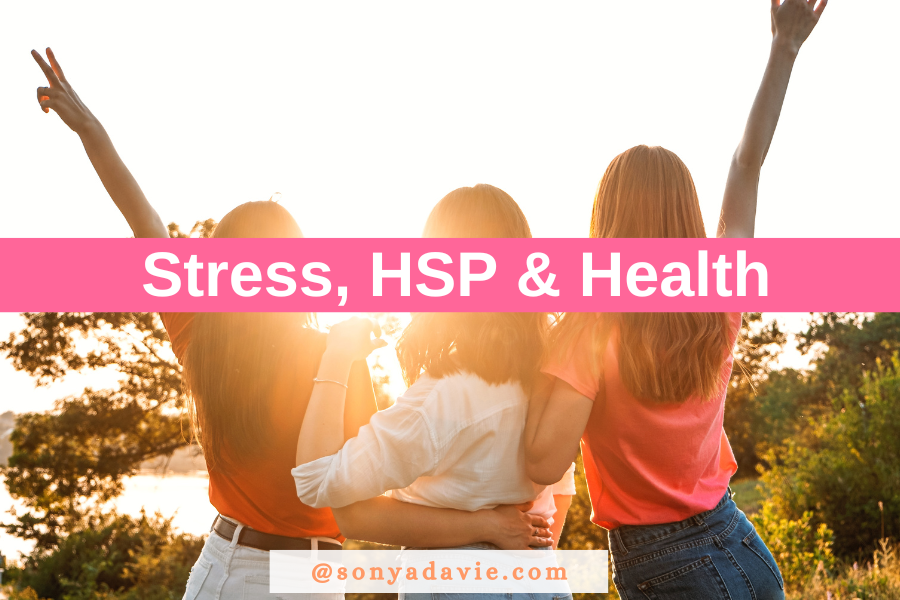
This post is all about HSP and stress.
A new study by Jordan Buren, a PhD student at the University of Texas, and Dr. Grant Benham, a seasoned Health Psychology professor, reveals that perceived stress may serve as a crucial link between sensitivity and physical health.
👉 Their research indicates that in a predominantly Hispanic population, perceived stress mediates the relationship between sensory processing sensitivity (SPS) and poor physical health.
Let’s dig in more!
Understanding Sensory Processing Sensitivity (SPS)
Sensory Processing Sensitivity (SPS) is a unique personality trait found among Highly Sensitive People (HSPs), characterized by heightened responsiveness to both external stimuli and internal emotional experiences.
👉 Individuals with SPS often process sensory information more intensely, leading to stronger reactions to their environments, social interactions, and even their own thoughts and feelings.
This sensitivity can manifest in various ways, such as being easily overwhelmed by loud noises, bright lights, or chaotic situations, while also experiencing deep empathy and emotional responses.
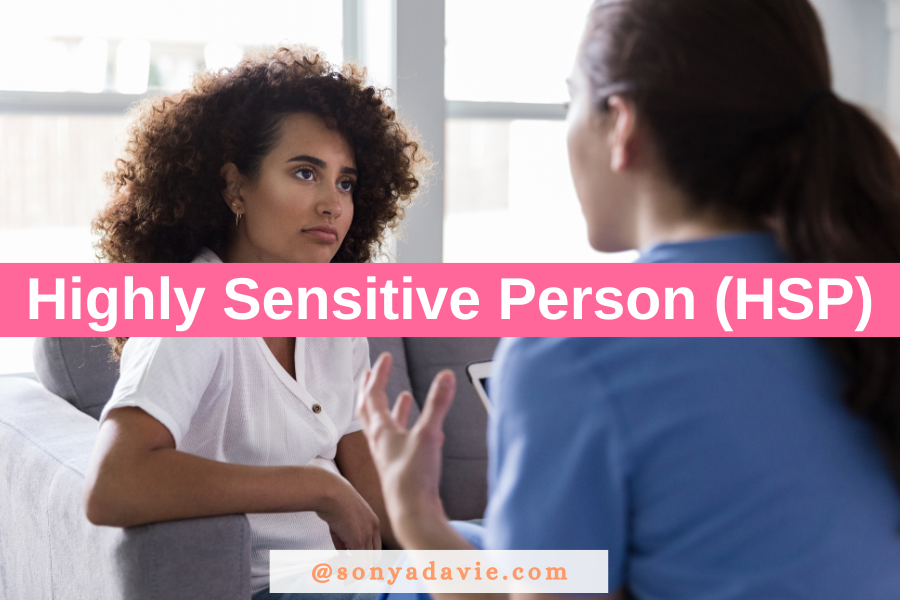
If you’re curious to learn more about HSPs and the myths surrounding this trait, click here!
Key Insights from the Study: Stress as a Mediator Between Sensitivity and Health
Buren and Dr. Benham’s study included 923 participants, primarily Hispanic young adults, who completed an extensive online survey. This survey assessed SPS using the Highly Sensitive Person Scale and measured perceived stress and physical health outcomes with reliable health inventories.
Their study demonstrated that individuals with high SPS scores experienced poorer self-reported physical health, especially when combined with elevated stress.
It’s like stress is a “middleman” that takes sensitivity to another level, impacting health more directly.
Although the study found that higher SPS is associated with poorer physical health, the fact that this may be partially driven by increased stress offers a glimmer of hope.
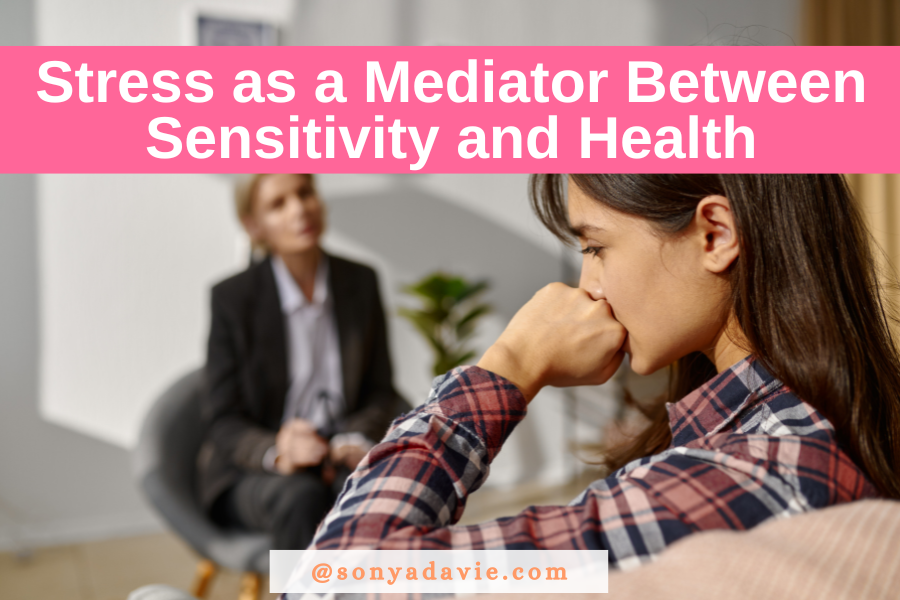
So, What Can You Do About It?
Here’s the good news: As HSP, stress is something you can manage, even if sensitivity is part of your nature (often an inherited trait).
With the right strategies, you can reduce your stress levels and protect your health, allowing your sensitivity to become a superpower rather than a source of strain.
7 Practical Tips for HSPs to Manage Stress and Enhance Well-Being
If you’re a Highly Sensitive Person (HSP), you know how overwhelming the world can be. Everyday situations—like crowded places, loud noises, or even emotional conversations—can leave you feeling drained or anxious.
To help you find your footing, here are seven practical strategies to manage stress and boost your well-being:
1. Practice Mindfulness
Mindfulness is your friend! Try simple exercises like meditation or deep breathing to help you stay grounded. This way, you can observe your thoughts and feelings without getting caught up in them, making it easier to navigate daily stressors.
2. Create Calming Environments
Your surroundings matter! Design a peaceful space at home that minimizes sensory overload. Soft lighting, cozy blankets, and calming scents can transform your space into a refuge where you can recharge.
Need inspiration for a cozy bedroom sanctuary? Click here!
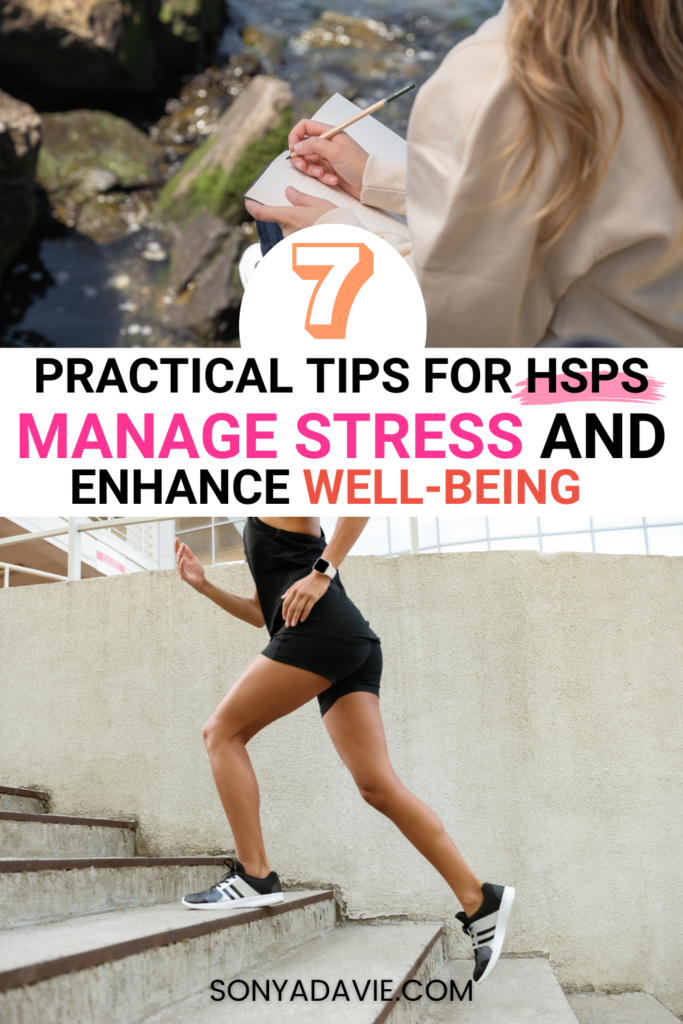
3. Seek Social Support
You don’t have to go through this alone! Surround yourself with people who get it—friends, family, or support groups. Sharing your experiences with others who understand can provide a sense of validation and ease feelings of loneliness.
4. Engage in Physical Self-Care
Taking care of your body is crucial. Make time for regular exercise, eat nourishing meals, and prioritize quality sleep. These habits not only help reduce stress but also strengthen your resilience against life’s challenges.
Check out my collection of Self-Care Essentials Here
5. Establish Boundaries
It’s okay to say no! Knowing your limits is essential for HSPs. Set boundaries with work, social events, and even family commitments to protect your energy and maintain balance in your life.
6. Explore Creative Outlets
Get those creative juices flowing! Whether it’s painting, journaling, or playing an instrument, finding a creative outlet can be a fantastic way to express your feelings and process your experiences, which can lighten the emotional load.
Need one to get started? Check out my curated Coloring Books.
7. Practice Self-Compassion
Be gentle with yourself! Acknowledge that feeling overwhelmed is part of being HSP. Give yourself permission to take breaks and treat yourself with the kindness you’d offer a friend in the same situation.
Looking Forward: A Path to Better Health for HSPs
The recent research emphasizes that perceived stress is a modifiable factor in the SPS-health relationship. By focusing on stress reduction, HSPs can actively improve their physical well-being as well. This approach creates a new avenue for highly sensitive individuals to thrive, showing that while sensitivity can be a challenging trait, it doesn’t have to compromise health.
With effective stress management, HSPs can enjoy a balanced, healthy life that honors their sensitivity and turn their sensitivity into a source of strength.
Embracing the Season: HSP and DST Transition Sensitivity
As the days grow shorter and we transition into fall, many Highly Sensitive Persons (HSPs) may find themselves feeling the effects of this change more acutely.
The shift to Daylight Saving Time (DST) can disrupt your routines and amplify feelings of discomfort. To help you navigate this transition with ease, here are some cozy essentials to create a warm and inviting atmosphere in your home.
It’s time to “Fall Back into Comfort”!
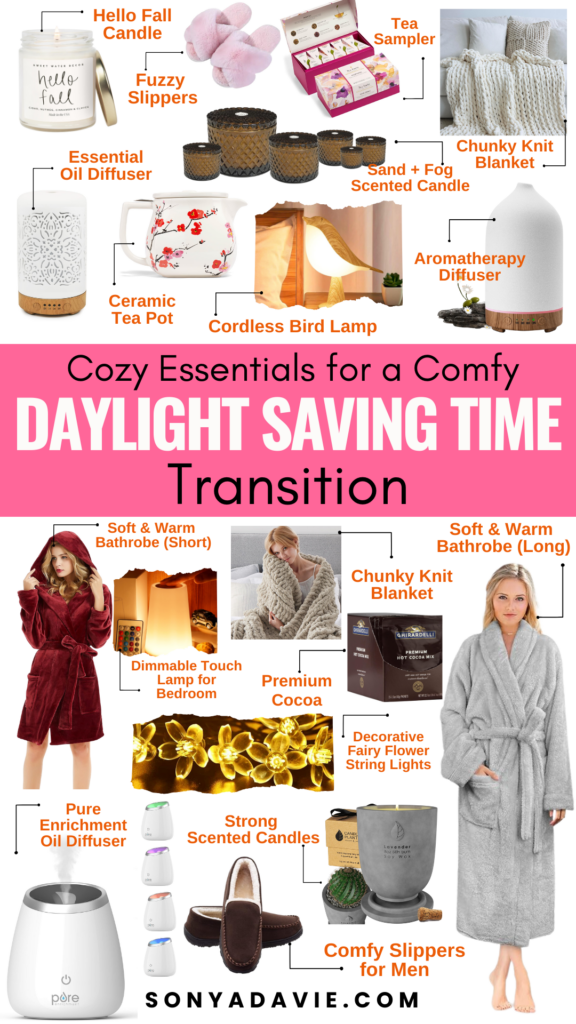
Scented Candles:
Light up your space with soothing scents. Candles can create a calming ambiance and help reduce stress after a long day. Choose fragrances like lavender or vanilla to promote relaxation.
Oil Diffusers:
Enhance your environment with an essential oil diffuser. Diffusing calming oils like eucalyptus or chamomile can help create a peaceful atmosphere that eases anxiety and boosts your mood.
Night Lamps:
Soft lighting can make a huge difference. Consider using night lamps with adjustable brightness to create a cozy glow in your space, especially during those darker evenings.
Comfy Bathrobes:
Wrap yourself in comfort with a soft, cozy bathrobe. Having something warm and plush to wear around the house can make you feel safe and nurtured.
Herbal Teas:
Sip on warm herbal teas to unwind. Chamomile, peppermint, and ginger teas are excellent choices for soothing your mind and body while helping you relax as the temperature drops.
Fuzzy Slippers:
Keep your feet warm and toasty with fuzzy slippers. They’re perfect for padding around your home and can add an extra layer of comfort during those cooler evenings.
Explore these cozy essentials to help you embrace the fall season. By creating a comforting space, you can make this transition smoother and more enjoyable.
Overall, the research discussed above suggests that sensitivity doesn’t have to lead to poor health.
By nurturing yourself, you can allow your sensitivity to enrich your life instead of letting it hold you back.
Therefore, it’s important for you to prioritize stress relief, build resilience, and fully embrace the beauty of being a Highly Sensitive Person.
This post is all about HSP and stress.
+ show Comments
- Hide Comments
add a comment